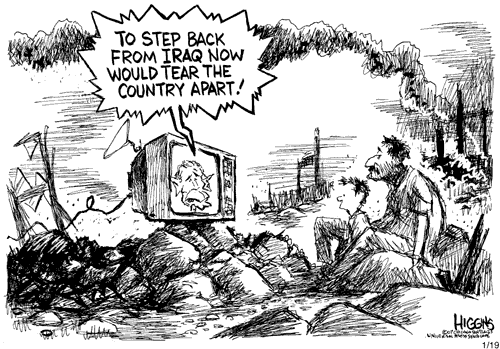Saturday, January 20, 2007
The Nation: Iraqi Death Toll: Why the UN Can't Count

Iraqi Death Toll: Why the UN Can't Count
By Jon Wiener, TheNation.com
Posted on January 17, 2007, Printed on January 18, 2007
http://www.alternet.org/story/46872/
The new UN estimate of 34,000 Iraqis killed in 2006 made headlines around the world, but it's almost certainly far too low. The number, as the New York Times reported, was "the first attempt at hand-counting individual deaths for an entire year," and was based on information from "morgues, hospitals and municipal authorities across Iraq."
The first problem with the UN count is that refers only to civilians -- and thus almost certainly omitted deaths of Iraqi policemen, soldiers, insurgent fighters, and members of private militias like the Badr brigade. News media failed to report how the UN separated "civilian" casualties from the total, and the UN notably failed to report the total including non-civilians.
The second problem is the UN's methodology, which relied mostly on tallying official death certificates. The UN, according to the Times, argues their methodology is reliable because "a vast majority of Iraqi deaths are registered" with officials because Iraqis want to "prove inheritance and receive government compensation." But many bodies found in mass graves or ditches are unidentified. And there's another problem: according to the L.A. Times, "Victims' families are all too often reluctant to claim the bodies ... for fear of reprisals." And of course chaotic wartime conditions in several provinces make it difficult for officials there to issue death certificates even when victim's families do not fear reprisals.
None of the reports in leading newspapers mentioned the other count of Iraqi deaths: the Johns Hopkins study reported last October in the prestigious British medical journal The Lancet. They estimated that 650,000 Iraqis had died as a result of the war -- 600,000 from violence and 50,000 from other war-related causes. President Bush rejected that figure -- "I don't consider it a credible report," he told a press conference last October -- and most of the media seem to have agreed.
But The Lancet study used state-of-the art demographic techniques, the same methodology employed to estimate war deaths in Kosovo, Congo, and Rwanda, and in natural disasters around the world. World leaders have cited those figures repeatedly without questioning their validity. It's the same methodology used in political polls in the US: the random sample.
Instead of trying to find documentation for individual deaths, The Lancet demographers, led by Gilbert Burnham of Johns Hopkins University, interviewed 12,000 people in 1,800 randomly selected households across Iraq. At each household, they asked how many people were living there currently, and whether anyone who had lived there had died since Jan. 1, 2002, and if so, whether they died before or after March 2003, when the war began. That made it possible to compare wartime death rates with pre-war rates.
Critics like Fred Kaplan at Slate.com objected. They said 12,000 was far too small a sample for a country of 30 million. But in the US, as country of 300 million, 1,000 people are interviewed in the typical political poll, and nobody objects to that sample size.
Critics also questioned whether The Lancet demographers really were able to interview all the people selected by their randomizing methodology. The demographers respond that they employed Iraqi physicians rather than Americans to do the interviewing, and that the response rate was extremely high, much higher than with political polling in the US.
There's one caveat about The Lancet study -- their estimate of 650,000 wartime deaths covers the period that ended in July 2006. By all accounts the violence has increased significantly since July -- so The Lancet figure now itself is undoubtedly too low.
Jon Weiner is a history professor at the University of California, Irvine. His most recent book is Historians in Trouble: Plagiarism, Fraud and Politics in the Ivory Tower (New Press).